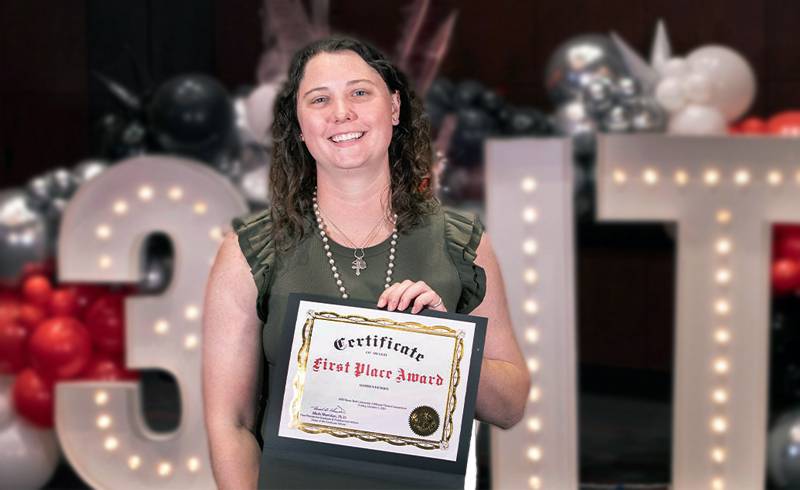
Two graduate students from Texas Tech University’s Davis College of Agricultural Sciences & Natural Resources have earned top honors in the university’s annual Three Minute Thesis (3MT) Competition, an event that challenges scholars to distill complex research into a concise, accessible presentation.

Jayme Czap, a master’s candidate in the Department of Natural Resources Management from Georgetown, Texas, claimed first place for her talk on how bats in East Texas select bridges as roosting sites. Ivette Morales, a master’s student in the Department of Plant & Soil Science, earned second place for her research examining how human well-being is linked to a sense of connection with the natural world.
The competition, held Oct. 3 in the Student Union Building, featured 50 graduate students who each had three minutes and a single static PowerPoint slide to communicate their research to a panel of judges drawn from Texas Tech and the Lubbock community.
Czap’s presentation explored which types of bridges in East Texas are most frequently used by roosting bats and whether seasonal variation influences their presence. “I found five species roosting in bridges, with concrete box girder bridges being the most frequently used,” she said. “Interestingly, season had no significant effect on bat presence. By understanding how bats select these resources, we can transform ordinary bridges into unexpected tools for conservation.”
Richard Stevens, Czap’s graduate advisor and chair of the Department of Natural Resources Management, added her findings come amid increasing recognition of the vital role bats play in U.S. agriculture. Nationwide, bats provide an estimated $22.9 billion in ecosystem services each year by consuming crop-damaging insects, including some of the most economically destructive pests.
Morales’s presentation, “Nurturing Green Hearts: The Relationship Between Connectedness to Nature, Well-Being, and Ecocentrism,” bridged the disciplines of human psychology and plant science. Her research focuses on how personal well-being correlates with feelings of connection to nature.
“While most of our projects center on plant breeding and genetics, Ivette’s work connects the human experience with the natural world, highlighting our deep interconnectedness with nature,” said Rosalyn Shim, Morales’s graduate advisor and an associate professor of plant breeding and genetics. “By exploring the nexus between plants and the human psyche, she underscores the importance of integrating human well-being into plant and soil sciences.”
Davis College has developed a strong record of success in the 3MT competition. Last year, animal science doctoral candidate Mollie Green won first place for her presentation, “Meat, Marbling, and Macrophages: The 3M’s on How Marbling Is Associated with Increased Lipid Associated Macrophages in Beef Steers.” In 2019, Delaney Foster, a master’s student in plant and soil science, took top honors for her research on herbicide use in cotton production systems.
CONTACT: Noureddine Abidi, Texas Tech Interim Associate Vice President for Research & Innovation and Associate Dean for Research, Davis College of Agricultural Sciences & Natural Resources, Texas Tech University at (806) 742-2808 or noureddine.abidi@ttu.edu
1008NM25
